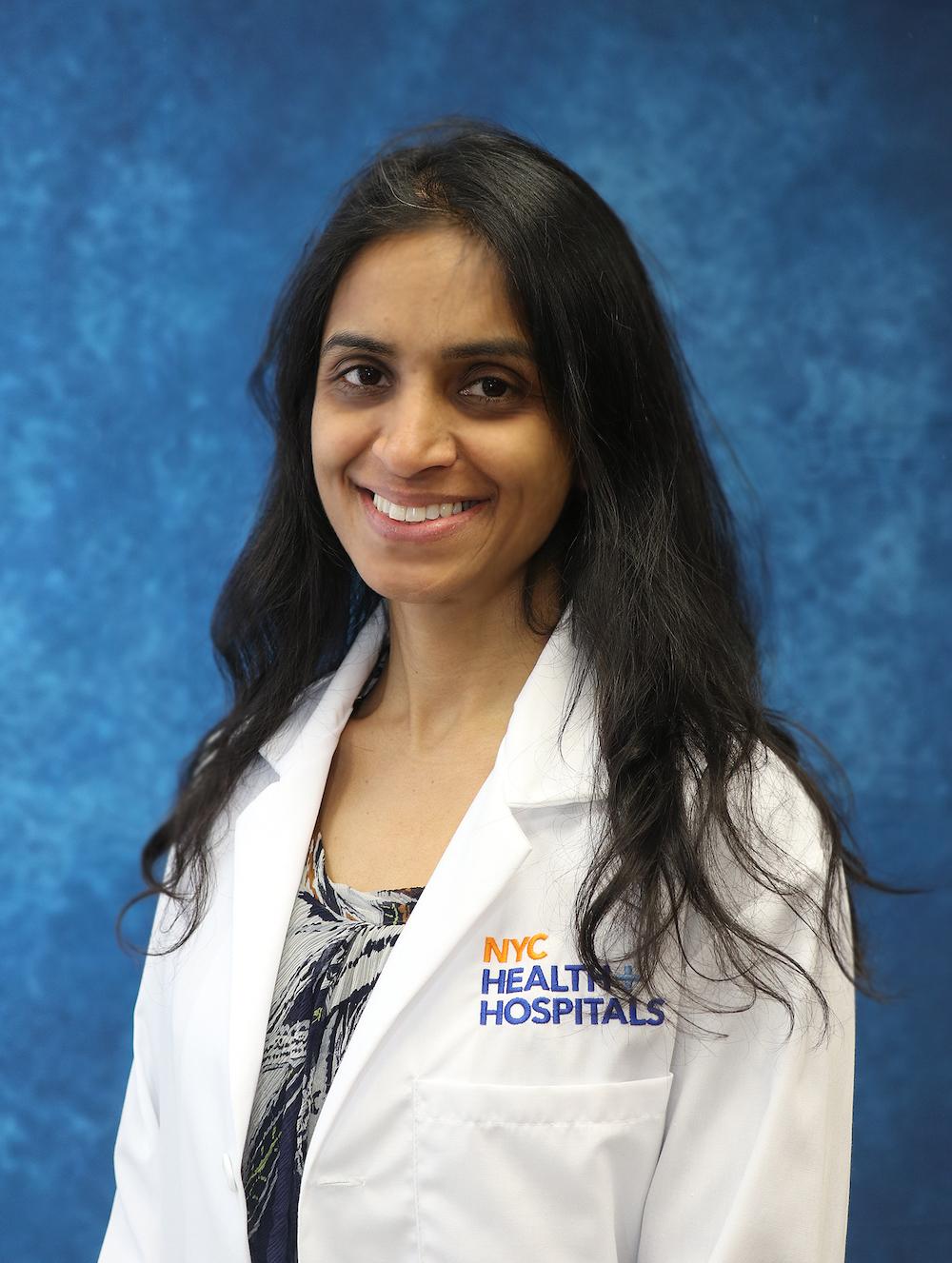NYC's New Plant-Based Medicine Program Is Healing High Cholesterol and Obesity With More Plants and Less Medicine
Dr. Sapana Shah chats with Green Matters about Bellevue's new plant-based medicine program.
Updated March 19 2019, 2:04 p.m. ET

"Every single piece of fruit and vegetables is like medicine." Just listening to Dr. Sapana Shah share her philosophy on the medicinal powers of produce is enough to make any kid (or adult) want to eat more fruit and veggies. Dr. Shah is one of four lifestyle medicine physicians working at NYC Health + Hospitals/Bellevue's Plant-Based Lifestyle Medicine Program, where she specializes in the treatment and prevention of chronic diseases with one prescription: plants. Green Matters recently spoke with Dr. Shah over the phone to learn more about the program, which is the first of its kind to be instituted at a public hospital in the U.S.
Bellevue, the country's oldest public hospital, formally launched the Plant-Based Lifestyle Medicine Program in mid-January. According to its website, the program is open to people living with: type 2 diabetes, pre-diabetes, high blood pressure, high cholesterol, excess weight, and heart disease. Over the course of the program, patients meet with three professionals: a physician, a dietician, and a health coach. Since the program kicked off in January, 64 patients have enrolled.
When patients first enter the program, they meet with Dr. Shah or one of the other doctors for an assessment. "We do a comprehensive assessment of any medications they're taking, their family, social context, and any obstacles to making changes," Dr. Shah tells Green Matters. "We do a baseline assessment of their blood pressure, their weight, their cholesterol values, their blood sugar control ... And we find out how ready they are to make changes, and then we make an overview of nutritional recommendations, where we basically promote a whole foods plant-based diet. A diet that's rich in fruits, vegetables, legumes, and whole grains, avoiding animal products, refined grains, oils, and sugars. And then we discuss how the dietary changes will potentially impact their specific chronic condition."

Dr. Sapana Shah
If patients are on any medications related to their qualifying disease, Dr. Shah has them in for a followup appointment after a few weeks, because changing to a plant-based diet yields fast, palpable results for some people. "If they're on any medications for diabetes or high blood pressure, we [will see them again] within two to four weeks to make sure the medications don't need to be adjusted, because we definitely don't want someone to become hypoglycemic or [have] too low of a blood pressure," she says. "These are real risks for patients who switch completely from the standard American diet to a whole foods, plant-based diet." By coming in for a followup appointment and getting their medication doses adjusted, patients can avoid that risk, and enjoy a lower dose of their meds.
Going forward, patients meet with their dietitian and health coach every two weeks. In those meetings, the dietitian and health coach further monitor progress, review the successes and struggles of patients' daily diets, make sure patients are staying on track with their goals, and eventually establish new goals.
In terms of providing patients with meal plans, Dr. Shah, the dietitians, and health coaches build them around each individual patient's preferences, all while keeping their culture in mind. "The dietician really tries to provide more culturally appropriate suggestions for patients, because we see patients from many parts of the world here at Bellevue, and so our dietitians and health coaches are actually trained to work with patients and provide dietary recommendations within their cultural context," Dr. Shah says. That said, a general day of meal recommendations for a patient looks something like: oatmeal with fruit or tofu scramble for breakfast, a large salad with beans for lunch, and a whole grain pasta or rice with veggies for dinner. Dr. Shah encourages fruit or veggies as snacks.
When asked if there are any patient success stories so far, a 61-year-old woman living with high blood pressure, diabetes, and obesity immediately pops into Dr. Shah's mind. She tells us:
"We've only had six weeks of this program, and one of my patients who I saw at the very beginning, she's been following up with the health coach and the dietician every two weeks, and she's just made remarkable changes in her diet. She eliminated animal products, she's reduced the oil and is cooking with vegetable broth, and she's just experimenting with all different seasonings and recipes. She's super motivated. And in 6 weeks she lost 13 pounds, she has energy to exercise ... She's so excited, and finds the support she's getting from the dietician and the health coach really helpful for her. And they have lots of tips for her when she comes back with different things she can try, which has been working for her. So she's exactly why we have this program, because it's daunting to make those changes on your own, and you can imagine any kind of obstacle could derail you from your goal, so just meeting up regularly with our health coach and dietician just keeps the patient on track with her own goals and what she wants to achieve. And she's so happy."
Dr. Shah is a walking encyclopedia when it comes to statistics regarding plant-eating. She cited several studies pointing to how eating more fruits and vegetables can lower the risk of heart disease and diabetes, including a 2016 study by Harvard titled "The power of plant-based protein: A longer life?" The study followed more than 170,000 participants for three decades, and found that patients who consumed more animal protein had a greater risk of dying from cardiovascular disease, and that patients who ate more plant protein had a slightly lower risk.
She adds that it's OK if people aren't ready to dive 100 percent into this new lifestyle, because something as small as replacing cow's milk with plant milk or eating more fruit can make a difference. "I don't want people to think they have to be completely whole foods plant-based to get the benefits of whole foods plant-based. Definitely the more you go, the more incremental benefits you'll see," Dr. Shah says. "Any amount of change you can make ... is so incredibly beneficial to people. I don't think people understand how important and how powerful the food we eat is, and the benefits we can get from eating that. And every opportunity that we have to eat is an opportunity to heal the body."
Eating plant-based sometimes gets a reputation of being more expensive — but one of Dr. Shah's patients proves that it's possible on a budget. "I have one patient who had been living in a shelter for most of last year and just got placed in housing. Even when he was in the shelter, he was making changes toward eating a whole foods plant-based diet," she says. "Now he has a kitchen. He is able, on his limited budget, to be able to make so many transitions to a whole foods plant-based diet. And he's reduced significantly the amount of insulin he's needed, from over 50 units to around 15 units."
In fact, Dr. Shah says that because of the health benefits many patients see after switching to a plant-heavy diet, they wind up saving money, since there will eventually be less money spent on doctor visits and medications.
In addition to the health benefits of replacing animal foods with plant foods, the lifestyle is also easier on animals and on the environment. According to the Food and Agriculture Organization of the U.S., animal agriculture accounts for 14.5 percent of human-caused greenhouse gas emissions on the planet. Not to mention, 56 billion land animals are killed for the animal agriculture industry every year, as per Faunalytics. So not only are you helping your personal health by reducing your intake of animal products, but also the environment and the animals.
If you are interested in transitioning to a plant-based diet, whether it's for your health, the environment, or the animals, but you do not have access to a program like Bellevue's, Dr. Shah has a few suggestions. She recommends that the veg-curious: watch the documentaries Forks Over Knives and What the Health, which both focus on the health benefits of eating plant-based; read Dr. Michael Greger's book How Not to Die and its corresponding cookbook; and sign up for the 21-Day Vegan Kickstart, a three-week plant-based challenge. If you are located in New York, you can contact Bellevue at 347-507-3695 to see if you qualify for the Plant-Based Lifestyle Medicine Program.